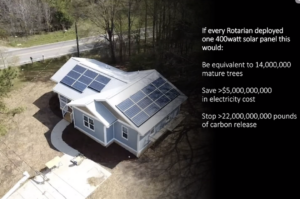by Ariel Miller, ESRAG Newsletter Editor

Guelph Habitat launch party: Ryan Deska of Habitat for Humanity Guelph Wellington, Nanita Mohan, President of the Rotary Club of Guelph; Rotary 7080 District Governor Brenda Halloran, and Carolyn Weatherson of ESRAG. Photo by Irene Szabo
Canada’s first-ever solar Habitat project is now underway and making headlines, thanks to the advocacy of Carolyn Weatherson, Past President of the Rotary Club of Guelph. And it’s huge: 70 low-income families stand to benefit from lower monthly energy bills, mitigating one of the factors in housing insecurity. This ESRAG initiative advances the UN climate goal of climate justice by reducing energy poverty and enabling more people to access clean energy. It reduces community exposure to harmful particulates from the burning of fossil fuels.
Habitat’s mission is to keep home ownership affordable, but the upfront costs of solar installations have been a huge barrier to both Habitat affiliates and participating families. Adding solar panels to the Guelph project will cost an estimated Can$750,000. Guelph Rotarians and community leaders are stepping up to apply for provincial and federal grants. When they succeed, families in the Guelph development will collectively save Can$62,000 a year. Over the 30-year life of the panels, their impact in reducing greenhouse gas emissions will be equivalent to planting 149,200 trees.
“This project has the potential to change building practices throughout Canada,” said Rotarian Liz Henke, MD in “The Power of Solar and the Power of Rotary,” a talk for ESRAG’s Projects + webinar on Nov. 22. “This project has strong support from Habitat of Canada who see it as a model for Habitat affiliates to add solar across Canada.”
Rotary’s solar partnership with Habitat began in the United States through ESRAG’s Renewable Energy Task Force (RETF). Families in several states are now benefitting from energy savings thanks to the ESRAG Habitat Solar initiative led by Dr. Henke (RC East Chapel Hill, North Carolina).ESRAG’s RETF with representation from Habitat for Humanity International developed a solar implementation manual for the US which offers practical advice on every phase from project planning to funding, acknowledging the significant variations in availability of grants, tax credits, and other financing across the states. Rotary Magazine showcased Habitat Solar in the September, 2023 issue drawing attention to the importance of a rapid transition to Renewable Energy and to the current inequities in deployment of solar for the underserved.
Weatherson learned about Habitat Solar from Henke and other RETF colleagues and has already adapted the Habitat Solar manual for Canadians.
 The Renewable Energy Task Force has launched a Million Solar Panel campaign to get all 1.4 million Rotarians around the world to be part of Rotary’s climate action. If you are a Rotarian and have ever installed solar panels, please fill out this form so the RETF can measure our progress! Since climate change is global, any panel anywhere contributes to reducing greenhouse gas emissions and protecting public health from methane and soot.
The Renewable Energy Task Force has launched a Million Solar Panel campaign to get all 1.4 million Rotarians around the world to be part of Rotary’s climate action. If you are a Rotarian and have ever installed solar panels, please fill out this form so the RETF can measure our progress! Since climate change is global, any panel anywhere contributes to reducing greenhouse gas emissions and protecting public health from methane and soot.
“‘Planting’ one solar panel has the same positive impact on our environment as 10 mature trees,” Liz Henke points out. “If you feel powerless in the face of climate change, we encourage every Rotarian to become part of the solution. Hasten the transition to renewable energy by buying solar panels for yourselves or those less fortunate.”
points out. “If you feel powerless in the face of climate change, we encourage every Rotarian to become part of the solution. Hasten the transition to renewable energy by buying solar panels for yourselves or those less fortunate.”
